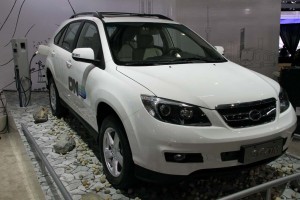
China's BYD is looking to triple it sales to 150,000 units in 2016 compared with last year's results.
BYD Auto, the Chinese electric car company, which counts Warren Buffett among its investors, expects to triple its sales of EV this year with the help of incentives offered by the Chinese government, according to a statement from the company.
The Chinese automaker is already one of the largest builders of electric vehicles in the world and last year built more electric vehicles than rivals Tesla, Ford and General Motors. Only Nissan with its Leaf sold more electric-powered vehicles. In all, BYD delivered 58,000 vehicles in 2015, and expects to sell up to 150,000 vehicles this year.
Global demand for battery-electric vehicles is expected to achieve a compound annual growth rate of 59.42%, according to a report available from Research and Markets of Dublin, Ireland. But this impressive growth could be even higher if BYD’s sales predictions are correct, the Irish firm suggested.
BYD Company Ltd. the parent company of BYD Auto, is one of China’s largest companies and has successfully expanded globally. Since the first of the year, the company has announced plans to sell its electric buses in Korea, Brazil and France and it has begun to export EVs to small markets, such as Costa Rica.
(Don’t blame battery cars for plunging oil prices. For more, Click Here.)
The company began as a battery technologies firm and it has become a leader in several high-tech sectors including high-efficiency automobiles, electrified public transportation and environmentally friendly energy storage, which is critical to the broader use of wind and solar power.
China has invested heavily in its electric vehicle charging infrastructure and implemented incentives to encourage consumers to make the switch to electric vehicles. China is expected to become the world’s largest market for electric cars soon and its government-industrial complex has dominating that sector as an official goal. Several cities around China are now require new taxi cabs to be EVs.
The government’s goal of having 5 million electric vehicles on its roads by the end of 2020 means automakers like BYD will greatly benefit from the growth. While the goal is ambitious, it is being driven by rising concerns over the air pollution that is choking cities, such as Beijing. The drive to add electric vehicles to the vehicle fleet in China is expected to proceed despite the relatively slow growth of the Chinese economy.
(From “powertrain” to “propulsion,” Click Here to see how GM is reinventing itself.)
Air pollution, which forced the Beijing municipal government to curtail driving several times last autumn, remains one of the largest sources of complaints to the Chinese government.
